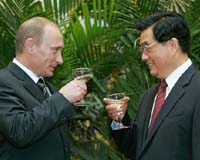Posted on Sun, Sep. 20, 2009
A bad idea for a photo op
Obama's chairing the U.N. Security Council will serve only to demean his office.
Claudia Rosett is journalist-in-residence with the Foundation for Defense of Democracies and writes a weekly column for Forbes.com
President Obama plans to make history Thursday by chairing a special, summit-level meeting of the U.N. Security Council. This will be the first time an American president has done so, and only the fifth time in the United Nations' 64-year history that such a heads-of-state meeting has been convened in that chamber. The focus will be on nuclear nonproliferation and disarmament. The pressure will be strong for Obama to emerge with some sort of substantive outcome that can be hailed as a success.
Beware. In the matter of making history, there are some things worth doing, such as breaking the racial barrier to the White House or ending the Cold War. And then there are other instances, in which, if something has never been done before, there may be good reasons for not doing it now.
In the case of chairing the Security Council, there are plenty of reasons a president should not do it, ever. It demeans the U.S. presidency, and there's a big risk it will bind Obama far too intimately to bargains for which America is likely to pay dearly and reap mainly trouble.
Why would it demean the presidency? The answer has to do with the art of U.N. diplomacy and the nature of the institution itself. When the United Nations was founded in 1945, it was imagined as a noble peace-promoting parliament of all mankind. It has not worked out that way.
The United Nations holds votes, but it is not a democracy, and it does not cleave to its own lofty charter principles about upholding human dignity. If it did, quite a number of member states, including one of the major founders, Stalin's Soviet Union, would never have been enrolled, and others would have been kicked out years ago (that's never happened).
In practice, the United Nations is a messy, murky despot-infested collective - opaque, girdled in diplomatic immunities, and thus largely unaccountable for its actions. The biggest voting bloc in the General Assembly is the 130-member G-77, which this year picked for its chair - I'm not kidding - the genocidal government of Sudan (whose President Omar al-Bashir is under indictment by the International Criminal Court).
The Security Council isn't all that much better. Chairmanship rotates monthly through all 15 members, with no regard for what kind of regimes that might entail. The five permanent members are democratic France, Britain, and the United States, plus despotic Russia and China. The current roster of 10 rotating members includes not only Japan and Austria, but Vietnam and Libya. This month it is America's turn to preside; Obama will sit in the same chair occupied in March by an envoy of Moammar Gadhafi's Libya. With heads of state summoned for Thursday's historic occasion, it's likely history will record the spectacle of terror-drenched tyrant-for-life Gadhafi sharing the table.
In this setup, the most law-abiding of the 192 member states tend to get stuck with the results of whatever the Security Council agrees to. The most unscrupulous, which account to no electorates back home, feel free to lie as they please and do whatever they can get away with, which is plenty, because the United Nations leaves individual member states to police their own compliance with U.N. deals. From the oil-for-food scandal to the current sanctions-busting traffic with the likes of Iran and North Korea, it is common practice for some Security Council members to violate, with impunity, the same deals they vote for. That goes far to explain why a series of "binding" Security Council resolutions over the last three years imposing sanctions on North Korea and Iran have failed to stop the nuclear programs of Pyongyang or Tehran.
Sending an envoy to navigate this scene and report to the president has the great advantage of leaving room to maneuver, revise, rethink, defuse, and deny without showcasing the U.S. president as petitioning support from whatever despot has been exalted to swing vote of the season. Even Jimmy Carter was not foolish enough to try the stunt of subbing for his own ambassador at the Security Council.
As to the results: It's a good bet that Obama will arrive at the table with a precooked deal to whip out as evidence of progress. His ambassador to the U.N., Susan Rice, hinted as much in a briefing earlier this month, saying, "We are consulting with colleagues on a potential product." That puts the pressure squarely on the United States to offer advance concessions, behind the scenes, for Obama's photo-op moment in the chair. Is there any connection here, for instance, with Obama's bid to please Russia by backing away from U.S. plans for a missile shield in Eastern Europe? We don't know, but it's a valid question.
As for the topics Obama has chosen for the occasion - nonproliferation and disarmament - Rice has announced that the session will not focus on particular countries. There are real, particular crises right now, related to nuclear ventures in North Korea and Iran, both of which badly need disarming. What we are likely to see instead is Obama's hoping to lead by example, with America pursuing its own disarmament, while fellow U.N. members say one thing, do another, and applaud for all the wrong reasons.




 Reply With Quote
Reply With Quote










Bookmarks